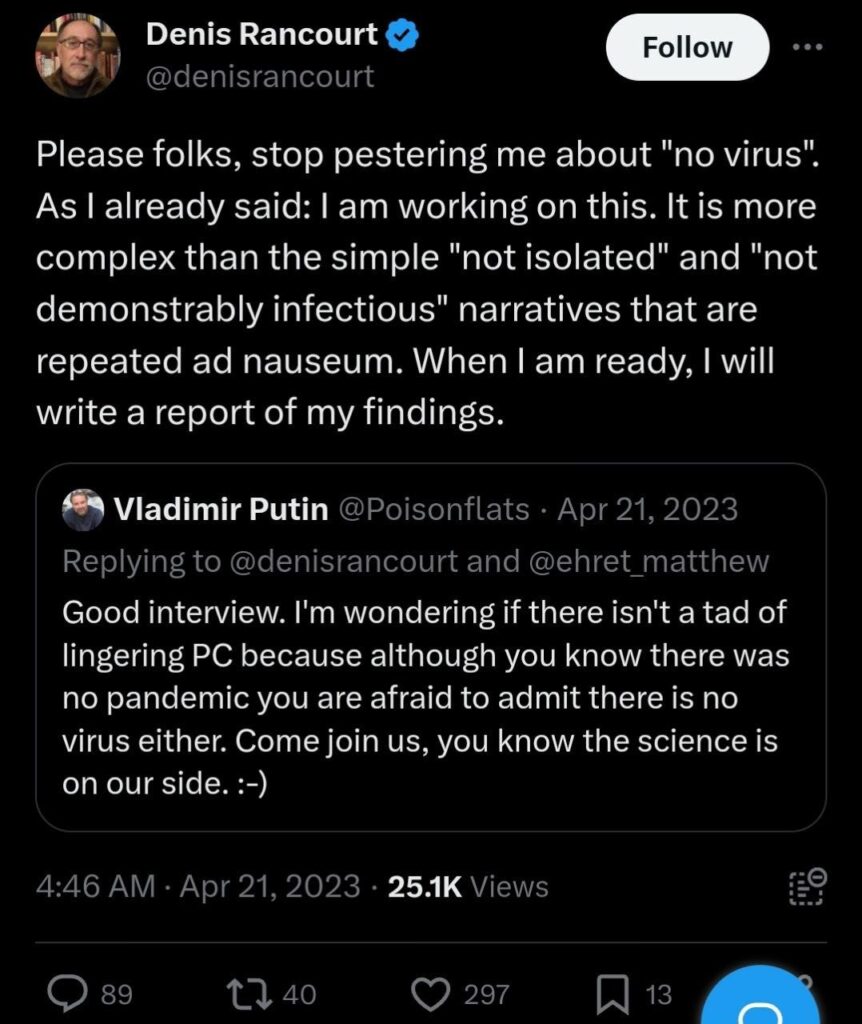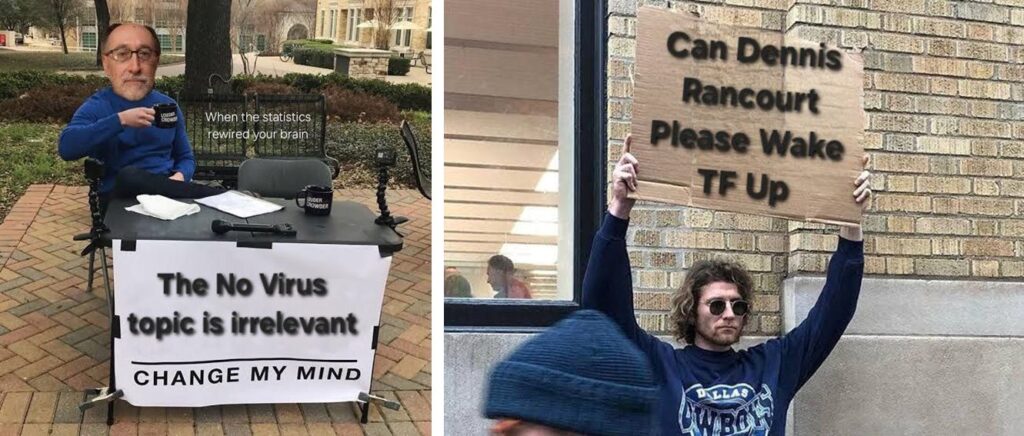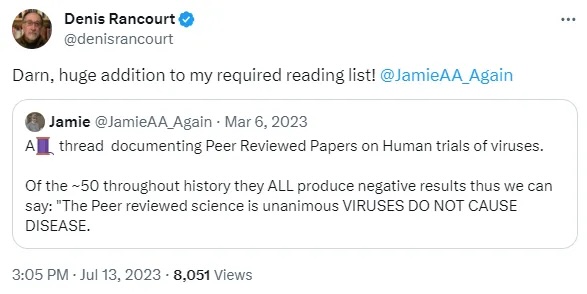I’ve written before about how germ theory denial is a constant thread in the antivax movement. As scientifically unjustifiable as it is to claim that pathogenic microbes are not the cause of infectious diseases, you can probably see how it makes a sort of warped sense for antivaxxers to be attracted to such denial, if only for the simple reason that if microbes don’t cause disease then vaccines are obviously unnecessary and can thus only cause harm. Germ theory denial, however, doesn’t just undergird a significant chunk of antivax beliefs; it is a general underlying component behind much of alternative medicine as well—and has been for a long time. There is, however, a rather odd form of germ theory denial that doesn’t actually deny that there are infectious diseases. Rather, it denies the existence of viruses specifically.
“No virus”?
What “inspired” me—if you can call it that—to write this post was yet another common antivax claim, namely that vaccines kill millions of people. I came across this claim when I came across a January Substack post by Denis Rancourt, who was peeved that Tracy Beth Høeg, of all people, had, in an obvious use of a tactic favored by cranks ranging from Joe Mercola to Vinay Prasad to try to claim the mantle of science and “reasonableness” by attacking even more bonkers cranks, taken him to task for his estimate that COVID-19 vaccines had killed 17 million people. That led me to discover that Rancourt also denies that viruses exist in a Substack post by Paul Alexander citing a Substack post by someone named Franklin O’Kanu praising Rancourt for an interview he gave with Steve Kirsch in which Rancourt said:
Anthony Fauci will go down in the Roman Overlord’s Hall of Fame. For the past 30 years, he has convinced the world about the reality of viruses, from HIV to the coronavirus pandemic. He has taken something invisible, something unproven, and convinced the world to not only believe in it but to invest in it, ensuring every citizen received this new petrochemical shot.
In the same interview, Rancourt said:
I’m not convinced that viruses exist.
Rancourt is “not convinced that viruses exist”? That’s nice. I was particularly amused by O’Kanu’s descriptions of Rancourt and Kirsch:
Denis Rancourt a leading figure in the community known for his data-driven research, made a startling announcement during an interview with
Steve Kirsch, another prominent member of the truth movement. Rancourt stated that he could find no evidence to prove the existence of viruses.
This bold statement has sparked intense debate and discussion as I have touched on myself in my article, Lies Not Discussed Within The Truth Community. Even though in the video you see Kirsch’s immediate shift of focus, the implications of Rancourt’s declaration cannot be ignored.

For those of a particularly masochistic personality bent, I provide a link to the Rumble interview. Know, however, that it is over two hours long, and even I couldn’t stand to listen to anywhere near the whole thing. Perhaps a few of you are made of sterner stuff than I.
It is rather amusing, though, how Rancourt’s assertion that “I’m not convinced that viruses exist” led even Steve Kirsch to rapidly change the subject, saying, “OK, OK, we’ve got to move on then.”
You can see the exchange favorably mentioned by a real die-hard virus denier here, a one-minute clip at the end of his Substack post. The main critical thing said about Rancourt is that it took him too long to reach this conclusion and that he hasn’t yet gone “all-in” on “no virus”:
I must also admit that for someone who is “new” to the topic he brings up some excellent points, countering Steve’s loaded questions with pinpoint precision. I clipped the most impressive part of his talk with Kirsch, which can be seen below (the full talk can also be seen here).
It must nevertheless be pointed out that Denis stills makes reference to an immune system as well as pathogens, and bacterial infections, but for someone to utter the words that “I don’t believe that viruses exist” it is a massive step in the right direction.
Who is Denis Rancourt, you might ask? You might have heard of him elsewhere, but, oddly enough, I’ve only mentioned him once before on SBM, and then only in the context of discussing why Steve Kirsch‘s ridiculously overblown claim a few months ago that COVID-19 vaccines had killed “only” 13 million people worldwide was such a steaming, stinking, load of fetid dingos’ kidneys and then only to say that it seems to be a law that antivaxxers must continually one-up each other regarding their estimates on how many people vaccines have supposedly killed or injured. Coming across Høeg’s rebuttal to Rancourt’s claim that COVID-19 vaccines had killed 17 million people led me down a deeper rabbit hole, however, and leading me to wonder, in retrospect, why I had never discussed him as the main topic of a full SBM post here before and had never even mentioned him over at my not-so-secret other blog.

Where did that rabbit hole lead, though? Come with me as I discuss a COVID-19 crank who, not satisfied with claiming that COVID-19 vaccines have killed 17 million people, but who also now denies that viruses—in particular SARS-CoV-2, the coronavirus that causes COVID-19—even exist. Rancourt is far from the only person who claims this. In fact, as I will relate, amusingly he faced criticism from even more vociferous virus deniers that he was too slow to come to the correct “no virus” conclusion and that he still has reservations, not having totally embraced the idea.
Who is Denis Rancourt embraces “no virus”
Before I delve into Rancourt’s actual claims, I wanted to know who he is and what, if any, qualifications he has to pontificate on the science of viruses and the epidemiology of COVID-19 and vaccine injury. Unsurprisingly, I soon discovered that, although he is a scientist, he is not a scientist who would be expected to have significant expertise in virology, epidemiology, infectious diseases, or other areas related to COVID-19. It turns out that Denis Rancourt is a former professor of physics at the University of Ottawa. On his website, Rancourt states:
I currently write about medicine, COVID-19, individual health, climate change, geopolitics, civil rights, political theory, sociology … and I have also written over 100 peer-reviewed-journal articles in technical areas of science and technology.
I obtained BSc, MSc and PhD degrees in physics. I held post-doctoral research positions at prestigious institutions in France and The Netherlands, before being a physics professor and lead scientist at the University of Ottawa for 23 years.
I am an experienced self-represented litigant at several levels of court and in many administrative tribunals, in both Ontario and Quebec. I have been a volunteer Researcher with the Ontario Civil Liberties Association (ocla.ca) since 2014.
A quick perusal of his website provides ample evidence that Rancourt is a crank about more than just COVID-19 (although there are ample reasons just on his website to consider him a COVID-19 crank as well). For example, he’s a climate science denier who denies that human activity producing CO2 and other greenhouse gases is warming the planet, calling climate change a “gargantuan lie.”
Rancourt also conveniently neglects to mention why he is a “former professor of physics” and not still University of Ottawa faculty. It’s a rather odd history in which, back in 2009, Rancourt was fired for, well, let’s just look at this article:
The University of Ottawa has fired controversial physics professor Denis Rancourt.
He was suspended in December after he attracted national attention for his teaching methods, including giving a grade of A+ to every student in an advanced physics class.
Rancourt plans to grieve the dismissal with his union, which in turn will take it to court, he said.
Speaking from New York City where he was giving a lecture at New York University’s Frederic Ewen Academic Freedom Center, Rancourt said he got the news Wednesday in a letter delivered to his home by courier.
The university’s board of governors’ executive committee met Tuesday and issued the letter the next day.
The decision was ultimately upheld, but took years of litigation.
I won’t really comment much on this incident. It strikes me as rather odd, and I strongly suspect that there was more to it, given what’s in his Wikipedia entry. For example, there was an incident in which there were unauthorized people in his lab, but also Rancourt claims that the real reason for his firing was related to his political views with respect to the Israel-Palestine conflict and accused University of Ottawa president of being “a point-man of the Israel lobby at the University of Ottawa.
Whatever the conflict with the University of Ottawa that cost him his job, during the 15 years since his firing Rancourt has descended further and further into a rabbit hole pseudoscience, conspiracy theories, and crankery, with the rabbit hole having expanded greatly when the pandemic hit in 2020.
Which leads me to a 17-minute segment of Kirsch’s interview with Rancourt in which he lays down his reason for doubting viruses exist, refers to “so-called influenza,” and (sort of) qualifies it by doubting that you can make someone sick with a respiratory virus. (Maybe he’s just denying that respiratory viruses exist?) You can find this segment within this Substack post. (Sorry, I couldn’t find a way to embed it.) There is also another video right at the beginning Comparing the two is a good way to see Rancourt’s increasing radicalization with respect to the existence of viruses.
In the first clip (which is only 2:20), Rancourt says:
The thing about the viruses is, our work on all-cause mortality shows unambiguously that there was no new virulent pathogen. Nothing special happened that would have caused death. If they had done nothing and not declared a pandemic and just done business as usual there would not have been excess mortality, period. We proved that. We proved it because we showed that the data is inconsistent with all the ideas of a spread of a viral respiratory disease, OK? It’s contrary to that. And we showed that where there was excess mortality it was directly related to the nature of the assault against the population.
Alright, once you’ve shown that, why are we debating whether or not viruses exist, you know? In my view—and this is, people get really upset with me when I say this—it doesn’t matter. It’s not what they said. That’s not how health works, and that I consider that academic question if that invented nanoparticle exists and do the magical things that they say it does, and they have this virology and so experts in academics go on and on about it. I don’t care. I don’t care because it doesn’t produce results in the real world.
I feel that way about immunology. Immunologists go on and on about the immune system and all its many mechanisms, and how it works, and how you develop immunity, and all these kind of things. A lot of that is high level theory, and they’re not always admitting that they’re only seeing a small part of the whole system, and even if they are seeing a larger part they’re not really seeing how all the parts are integrated together into something that is as complex as a human body living in society. So they’re not anywhere near understanding at the molecular level that they’re claiming how recovery from a disease works or why you would get a disease or what the disease is…
[Sound dropped out for me here.]
Cue the sound of thousands of immunologists who know so much more about disease and immunology than Rancourt all facepalming in unison.
Here you see a common technique of antivaxxers and COVID-19 minimizers, just on steroids. Whereas COVID-19 minimizers like those behind, for example, the Great Barrington Declaration, basically claimed that the virus was not dangerous to the vast majority of people (and so we should have “let ‘er rip” with poorly defined “focused protection” to keep the supposedly tiny minority for whom the virus was dangerous “safe”), here Rancourt is claiming that there was “no new virulent pathogen.” The assumption at that point last year when he gave the article is, to me at least, that he believed that there was such a thing as a virulent pathogen. Or maybe he didn’t. He just “doesn’t care” whether viruses exist:

Hard core virus deniers were not amused:

Don’t worry, though. As of last summer, Rancourt was moving in that direction:

Going back to the 17 minute video at the end of this Substack, which is a clip from the 2+ hour interview posted to Rumble six weeks ago, I note that Rancourt starts out by referring to the “so-called influenza.” He then moves on to liken the symptoms of COVID-19 to that of the flu and uses that to conclude, “I’m not personally convinced that there was something particularly new or special.”
After Steve Kirsch says he’s “going to push back” a little, Rancourt continues:
The other thing is, I have looked at the scientific literature and continue to research it for firm evidence that it has been demonstrated that you can spread a viral respiratory disease—in other words, that you can cause infection in a person using a virus—and I have not found any scientifically, OK?
It is, of course, very easy to fail to find evidence if you design your standards for what evidence you will accept to exclude evidence that scientists have accepted since viral respiratory diseases were discovered in the late 1800s, but, pray, do go on Mr. Rancourt:
For example, if you look at the work of Professor Sheldon Cohen, an American who spent his entire career trying to infect college age university students in the US when you were allowed to do that with what he thought was influenza… He was culturing the stuff and would put the fluid, either vaporized into their noses, or deposit it, or drop it in, or into their eyes, every way that he could… And what he found was—and this is really important—the people who got sick are the ones who had significant psychological stress in their life, and—these were the biggest factors that determined whether or not you were going to get sick—is psychological stress and social isolation. So the college students that didn’t have a big social network and were socially isolated and were stressed, they got sick, and the more isolated and the more stressed they were, the sicker they got.
Of course, this doesn’t demonstrate that viruses don’t exist or that you can’t infect someone with a respiratory virus. Quite the contrary! Rather, what it demonstrated is that one’s psychological health affects one’s susceptibility to infection with respiratory viruses. Indeed, here’s a 2006 paper by Cohen (who died in 2013) that looked at susceptibility to infection with influenza and rhinovirus as a function of positive emotional style (PES) in which he reported that high scores for PES were associated with lower susceptibility to becoming ill after a challenge with purified virus. Moreover, nothing in medicine is 100%, contrary to the way that Rancourt described it. The paper, for instance, demonstrated that 26.1% of low PES developed influenza symptoms, while 15.5% of high PES subjects did. That’s pretty impressive, a 40% decline in the chance of developing symptomatic influenza when exposed to purified virus, and, yes, the high PES subjects who did get sick had milder symptoms. This result suggests that emotional health is associated with a more effective immune system. It does not, as Rancourt implies, demonstrate that you can’t spread a respiratory virus and make someone sick. Again, quite the opposite, in fact! (Similar results were obtained with rhinovirus in this study.)
Rancourt also references the Rosenau experiment of 1918-1919 in which volunteers from the Navy were indeed isolated on an island, where Harvard professor Milton L. Rosenau attempted to give them the flu by various means or to force its spread by requiring the volunteers to stay together in close quarters. What Rancourt fails to note is that virology was very primitive at the time and at the time it was believed that a bacteria, known as the Pfeiffer bacillus, was used as the infectious agent in a tiny sample size. (It wasn’t confirmed that influenza was a viral disease until 1934.) There’s actually a good explanation on, of all places, Reddit why the Rosenau experiment didn’t yield any useful information, concluding that “the experiments were very poorly done by today’s standards, and it’s not surprising such sloppy work didn’t give them any insights.” Also in the thread were a number of references on how the transmissibility of influenza was established and how it needs to be done right. The point is that it is not nearly as easy as Rancourt, in his ignorance, seems to think it is to establish transmissibility, even back when the ethical standards for approving a challenge experiment were much more lax. Suffice to say, it can be done and has been done.
Amusingly, Kirsch—again, of all people—challenges Rancourt by bringing up the example of cruise ships in which one person gets sick from COVID and then, soon after, hundreds of people catch it, a surprisingly reasonable retort coming from someone like Kirsch. Rancourt’s retort? He claimed that it wasn’t the virus, but rather that the people were all “subject to the same conditions” and are “subjected to each other’s stress,” finishing, “You’ve got a bunch of old people locked on a ship. What do you think is going to happen?”
Alrighty then. Kirsch even goes on to “challenge” Rancourt by pointing out that SARS-CoV-2 is actually a virus that has been sequenced and is a novel respiratory pathogen, asking Rancourt, “Agree or disagree?” (You can predict the answer, right?) I have to admit that this next part of the interview led me to laugh out loud, as Rancourt airily dismisses the genetic sequencing methods as “highly unreliable,” “patchy,” and “fabricated.” Seriously, say what you will about sequencing DNA and RNA, but “highly unreliable” they are most definitely not. Indeed, with the advent of next generation sequencing and techniques to sequence whole genomes, the science of genomics and sequencing DNA is quite robust and, yes, reliable. As you might imagine, there’s nothing that I love more than a physicist airily dismissing a whole science that he clearly doesn’t understand. Seriously, just because you don’t understand a scientific technique doesn’t mean that it’s a bogus technique. At this point, Rancourt is reminding me of Paul Davies and Charles Lineweaver, two physicists who decided that they knew more about cancer than cancer biologists, resulting in them resurrecting a theory of cancer popular over a century ago that cancer biologists had ultimately abandoned because of its lack of explanatory power regarding cancer origins and development.
Rather than actually showing why he thinks SARS-CoV-2 sequencing is “unreliable,” Rancourt does a Gish gallop into talking about “variants of concern,” claiming they “never used to do this before COVID-19.” Oh, really? They’ve been doing it every year for influenza variants going back decades. It’s how vaccinologists try to predict which strains of influenza will be circulating in any given year and try to match that year’s vaccine to those strains. He even claims that there are “almost no” scientific papers demonstrating that this is even a thing. Again, oh really? Here’s a review article from 2021 about variants of concern discussing vaccine effectiveness against them. Here’s a study looking at Delta and Omicron that concludes that Delta was the most cytopathic and Omicron the fastest replicating. I could go on, but there are nearly 6,000 articles indexed in PubMed about or mentioning COVID-19 variants of concern. Nice of Rancourt to dismiss them all so easily by going on and on about how supposedly variants of concern are identified through short stretches of DNA and hundreds of sequences that are found apparently don’t count. Seriously the word is homology. You can relate genetic sequences to each other that are not identical and produce phylogenic trees of how evolutionarily related they are.
Rancourt claims to know a lot about “molecular science” and “how you measure things in science,” having taught spectroscopy, diffraction, microscopy and bragging about having had an electron microscope in his lab. Goody for him. That doesn’t mean he understands genomics, genetics, and DNA sequencing, his dismissal of the science of variants and DNA sequencing as being “garbage” with “no value whatsoever” notwithstanding, saying:
At this stage of my studies, I am not at all convinced that viruses, as a pandemic-causing agent, exist. I’m not convinced at all.
Kirsch actually pushes him, asking whether there was a novel pathogenic virus that appeared in 2020, and Rancourt says he “doesn’t see any evidence” for that or “any reason to postulate that.” Kirsch then tries to challenge him with anecdotal evidence, such as a paramedic who says he never noted SpO2 values (oxygen saturation measured by a pulse oximeter) as low as he had seen, and Rancourt doesn’t even know what that means, asking if it has something to do with “blood viscosity” and then later saying he doesn’t know what SpO2 measures. Basically, Rancourt is utterly ignorant of some very basic human physiology, the sort of thing taught in the first term of the first year when I was in medical school, but he feels competent to dismiss an entire branch of science? Seriously, man, if Steve “debate me, bro!” Kirsch has to explain to you what a pulse oximeter is and SpO2 is, and that a low, not a high, SpO2 is bad, you should be sufficiently ashamed to slink back into the rabbit hole you emerged from to spread what you found after having gone down it. I was cringing hard during this part of the 17 minute segment. By way of background, though, Kirsch was describing is a phenomenon called “happy hypoxia,” in which COVID-19 victims could look apparently fine and surprisingly not short of breath at alarmingly low oxygen saturations. Kirsch notes that this was a new phenomenon associated with COVID-19, which it was.
I can’t resist repeating again right here that Denis Rancourt doesn’t know what a pulse oximeter measures, why it’s important, or what SpO2 is, and in this interview has to be educated about such basic human physiology by Steve Kirsch! Dude, you need to put a paper bag over your head and just shut up. I can’t recall having cringed so hard in a long time.

So how does Rancourt respond? He pivots to saying that the factors with the biggest effect on human physiology are psychological stress and social isolation. That’s right. Those new clinical phenomenon observed by clinicians in those dark early and deadly days of the pandemic four years ago were all due to stress and psychology! Of course, this sounds a lot like a lot of other alternative medicine beliefs that I’ve written about before, such as German New Medicine and its bastard offspring Biologie Totale, which claims that cancer is due to suppressed psychological stress, just substituting societal stress, such as “lockdowns” and fear of the virus, for the suppressed psychological stress.
Indeed, Rancourt goes on and on and on about this for minutes, claiming that the respiratory system would be the one most affected by all this societal stress, which makes you susceptible to the bacteria already living on and in you. His evidence? People in poorer states died in higher numbers than in richer states. It never occurs to him that public health, access to healthcare, and other factors associated with poverty, such as living at high density, were likely contributors. He also claimed that the way we “stopped giving antibiotics” to people contributed because, supposedly, these same people got more antibiotic prescriptions and, without antibiotics, were more susceptible to bacterial infection. Apparently the concept of antibiotic resistance never occurred to him.
When that fails, Rancourt just says that he doesn’t believe what clinicians were telling people, as they too were apparently sheeple—in fairness, he doesn’t use the word, but it’s clearly what he meant—and believed all the government propaganda too.
Denis Rancourt is not alone
I had planned on writing more about Rancourt’s claim that COVID-19 vaccines killed 17 million, but I decided that this post had gotten long enough. Also, I’ve addressed one version of this “vaccine depopulation” claim promoted by Steve Kirsch, although Kirsch claimed “only” 13 million deaths from vaccines. Basically, all of these claims rely on unjustified extrapolation from a relatively small number to the world’s population. Perhaps I will return Rancourt’s version of this claim, either here or at my not-so-secret other blog in the near future. In the meantime, as I noted before, Rancourt is downright “reluctant” to say that viruses don’t exist compared to some.
For instance, let’s go back to Franklin O’Kanu, who describes the “consequences of a world without viruses”:
The implications of Rancourt’s statement are profound and far-reaching. If, as he asserts, there is no evidence to support the existence of viruses, then we must reevaluate much of what we have been told and accepted as truth. This statement, if true, has significant consequences for our society.
Consider the events of the past few years. Lives were disrupted, livelihoods threatened, and jobs lost due to a threat that, according to Rancourt, myself, and others, does not exist. Experimental procedures were administered in the name of health for a non-existent threat. The real-world implications of holding onto false ideas are severe and have caused untold suffering.
I personally know a physician who lost their father because he was put on antiviral medication. If Rancourt’s statement holds, did we need to start that antiviral medication? Do we need antiviral medications at all? The same question applies to vaccines, especially as Steve Kirsch has shown that vaccines can cause autism4.
These are the implications of an industry built on pseudoscience. The term “virus” translates to “poison,” and what we are witnessing is a poisoning of the mind. As I discuss in my article, it is possible to manifest symptoms of an infection, a so-called viral infection, through psychological stress.
In fairness, I will admit that, indeed, if there actually is no such thing as viruses (or at least respiratory viruses that can cause a pandemic), then, yes, that would be a radical finding that would totally change how we view medicine and health. The problem with O’Kanu’s assertion is that it is pure bullshit (if you’ll excuse my language). We have mountains of evidence for the existence of viruses dating back over a century, as well as mountains of evidence for what diseases they cause, how they can be prevented with vaccines, how they are transmitted, and even how some of them can be treated with antiviral medications. Rancourt and O’Kanu can deny all that evidence all they want and try to convince you that diseases that physicians and scientists attribute to viruses are really due to stress and social isolation, but even the examples they cite don’t support that idea. Remember, for example, that that influenza challenge experiment showed that high PES scores were associated with only a 40% decrease in the risk of becoming ill after an exposure to the virus. Rancourt talks as though it were 100% and that all you need to avoid becoming sick is to be psychologically healthy (or at least not stressed) and not socially isolated, in much the same way that quacks have long claimed that you have complete control over your health.
I realize that it’s hard to believe that now, in the 2020s, there are people who really believe that viruses don’t exist and that respiratory infectious diseases like COVID-19 and the flu are a result of psychological stress and social isolation manifesting themselves as various symptomology and increased risk of bacterial infection, but unfortunately these people exist, and some of them are fairly decent propagandists. Also, when you believe that viruses don’t exist or can’t hurt you, it becomes all too easy to falsely believe that vaccines are too harmful to justify their use—or even that they’ve killed millions of people.
ADDENDUM 3/21/2024
Debunk the Funk reacts to the video, and it is hilarious, albeit not as hilarious as a crank fight between Denis Rancourt and Steve Kirsch.

